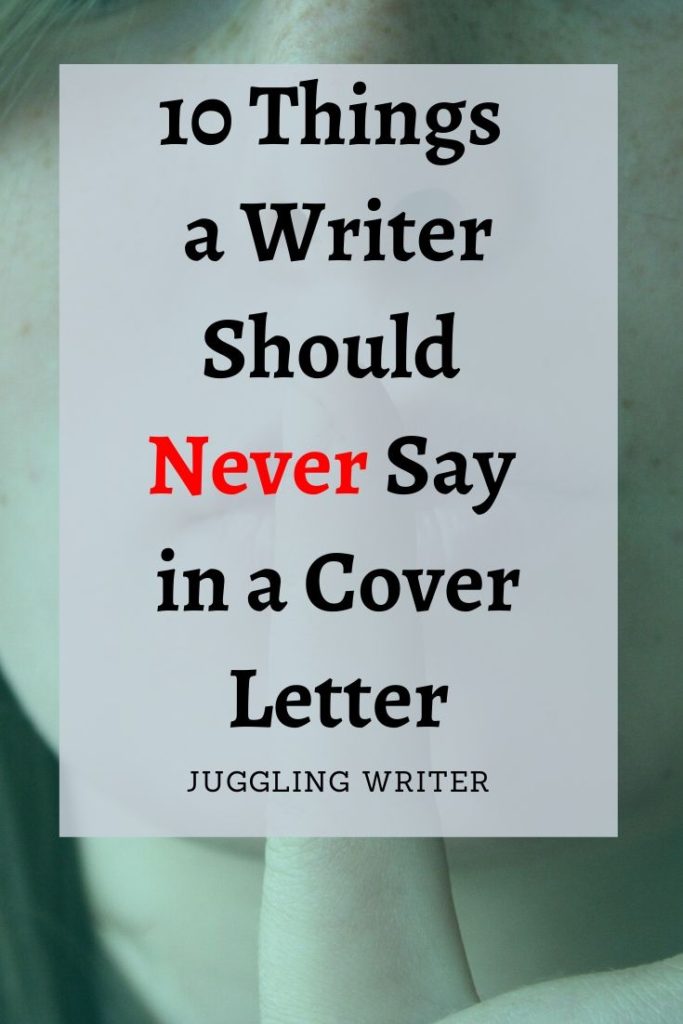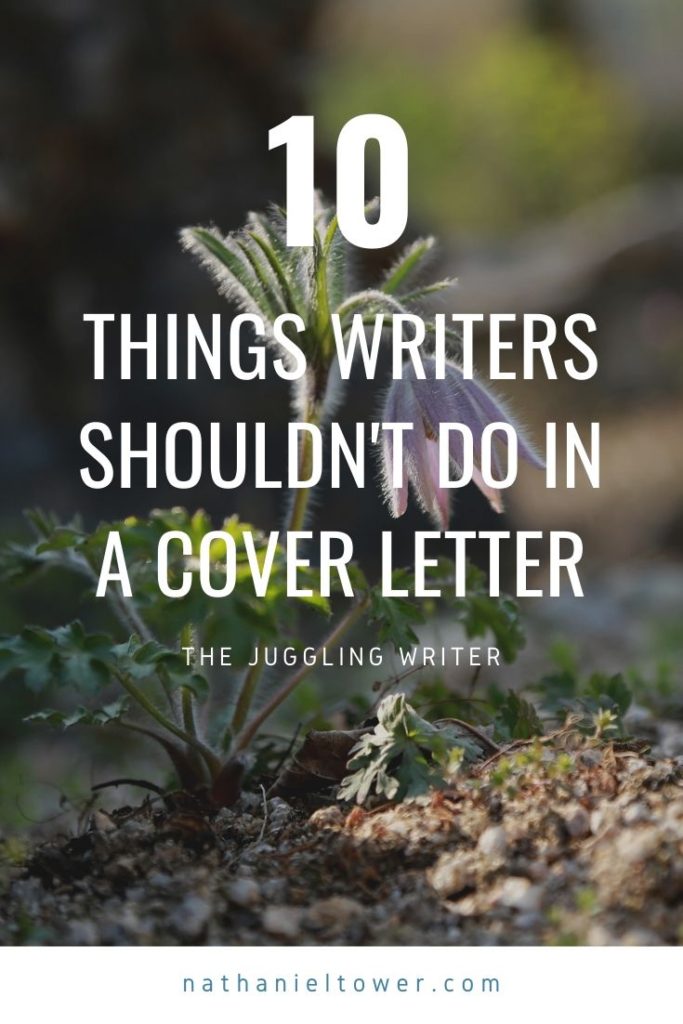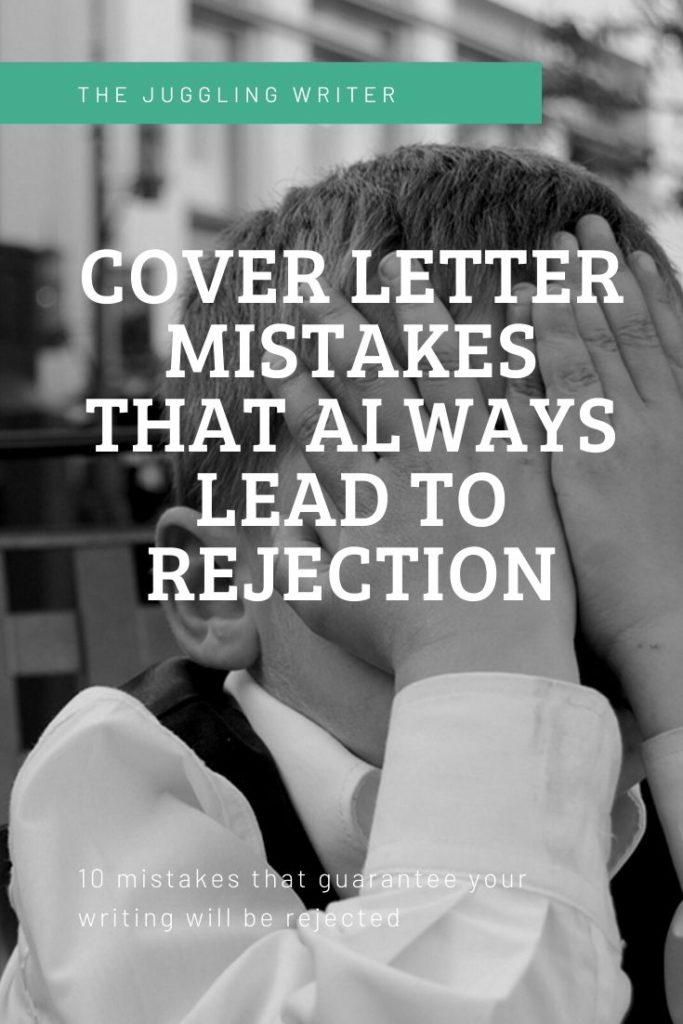Last Updated on July 7, 2020 by Nathaniel Tower
Your cover letter is arguably the least important part of a writing submission, but it can have a big impact on whether or not a piece is rejected.
It’s easy to argue the merit of your writing should stand on its own independent of a cover letter, and many editors don’t even look at the cover letter until after they’ve read your submission. Still, there are many cover letter mistakes that can lead to instant rejection regardless of how great your writing is.
As founder and editor of Bartleby Snopes literary magazine, I saw tens of thousands of cover letters from writers of all skill levels. While I’d like to think I never rejected anything solely based on the cover letter, here are some of the biggest cover letter mistakes I saw that certainly didn’t help the writer’s case.
Brag about how often your submission has been rejected by other publications
We’ve all heard the stories about the famous writers who had their work rejected dozens of times before landing that seven-figure book deal. It gives hope to all of us! But that doesn’t mean you should brag about how many times your writing has been rejected. I received hundreds of submissions with cover letters that went something like this:
My story has been rejected over fifty times by some really good publications, but I’ve gotten some encouraging feedback and decided to give you a shot at publishing it. I hope you like it.
So you’ve immediately set a few expectations for me:
1. Your writing isn’t good enough to be published elsewhere
2. There are at least fifty publications you would have preferred to mine
Now why exactly would I want to publish your work?
On the other hand, if you really want to mention how much your story has been rejected, you could include a note in your cover letter about how you’ve worked tirelessly to revise it to get it just right. That’s a story worth telling.
Admit it’s the first thing you’ve ever written
It’s fine if you’ve never been published before, but don’t tell the editor that you’ve never even written anything before. You’d be shocked at the number of submissions that arrived with a note about how the writer just started writing last week and this was the very first thing they finished. That immediately tells me they aren’t ready for publication. That’s not to say the first thing someone writes can’t be brilliant, but if you just started writing a few days ago, then you haven’t spent enough time working on the craft.
Address the wrong person or publication
I can’t even tell you how many times I received a cover letter that addressed a different publication or different person. If you can’t get the “Dear So & So” portion of a cover letter correct, then don’t bother writing one. Claiming you want to be published in “X” magazine more than anything while using the wrong name of the magazine sends the immediate message that you don’t give a rat’s ass if you get published in my magazine. Oh, and don’t assume the editor of a publication is a man. Take three seconds to figure out who you are submitting to before you submit.
Give an ultimatum
As a submitter, you aren’t in any place to negotiate. Publications receive thousands of great submissions they can’t publish. They don’t need your writing. If you approach your cover letter as an ultimatum, then you aren’t going to get an acceptance. I received plenty of cover letters that basically said to publish the writer’s story, or else. The “or else” varied from I’d be missing a great opportunity to the writer would find me and hurt me. Whatever the case, I never published any of these stories. Shockingly, the writers who included such ultimatums never submitted good stories, so it was always an easy decision.
List every publication you’ve ever had
It doesn’t hurt to mention a few of the places you’ve been published before. But your cover letter shouldn’t be a five-page list of every publication you’ve ever had. Instead of including everything, give an approximate number of publications you have followed by three or four of your top examples. That’s much more impressive than an unreadable list of everything.
Assume acceptance
I hate to say it, but odds are almost always on the side of rejection. Most publications have an acceptance rate under 10%. Your submission most likely won’t be accepted. You should never assume acceptance in your cover letter. It’s arrogant and rubs the editor the wrong way. No editor wants to be told what to do. Don’t tell me how quickly I’m going to publish your work. Heck, don’t even tell me how great it is. No, your submission probably won’t change my life. It’s much better to be humble.
Assume rejection
On the other hand, you shouldn’t automatically assume the submission will be rejected either. I would estimate I received over 1,000 submissions with a cover letter that said something like, “You probably won’t publish this, but it was fun to write it and send it to you.” If you don’t think I’m going to publish it, then why are you wasting my time? The easiest rejection to send is the one to someone who already thinks they are getting rejected.
Confess you’ve never read the publication before
In an ideal world, you would only submit your work to publications you’ve read and loved. I get this isn’t always feasible because of time. But that doesn’t mean you should tell an editor you’ve never read their publication before. Even if you just found out about a magazine, you shouldn’t mention it in your cover letter. This sets the immediate tone that you don’t care about being published by this venue. You just care about being published anywhere. Not a good message to send. Of course, an even worse message is to admit you’ve read a publication before and didn’t like it.
Lie about anything
You might think you won’t be caught if you tell a little fib about your story or your past publication history or about who you are. But you probably will be. Maybe not before your work is accepted, which is the worst possible outcome. When writers get caught in a lie, it usually ends their career. This is particularly true when white men pretend to be minorities to try to be published, but there are all types of lies that can come back to hurt you. Just tell the truth.
Say anything bad about anyone
I shouldn’t have to say this: Writers should all be positive and get along – or at least not say hateful things about one another. Here are some examples of the bad things writers have included in cover letters to me:
- Insulted other writers, including ones I’ve published
- Insulted my taste as an editor
- Included racist, sexist, or homophobic comments
Be a good person. Even if you hate other writers, keep it to yourself. And there is absolutely no place for racism, sexism, or homophobia in a cover letter. But thanks for telling me upfront you are a racist. Now I can reject your story without wasting my time reading it.
Final thoughts about cover letter mistakes
These certainly aren’t the only cover letter mistakes I encountered during my decade reading submissions, but they were the most frequent and the biggest mistakes. Honestly, your cover letter isn’t that important. More often than not, if the cover letter has any influence over the decision to reject or accept your work, it’s usually in favor of a rejection. In other words, a bad cover letter hurts you a lot more than a good cover letter helps you.
Keep your cover letters polite and simple. Don’t give the editor any reason to reject you. Remember, they already have way too many submissions to publish. A bad cover letter makes it too easy to say no.
What cover letter mistakes have you made in the past? Share your worst cover letter stories in the comments. And don’t forget to share this post on all your favorite channels.



